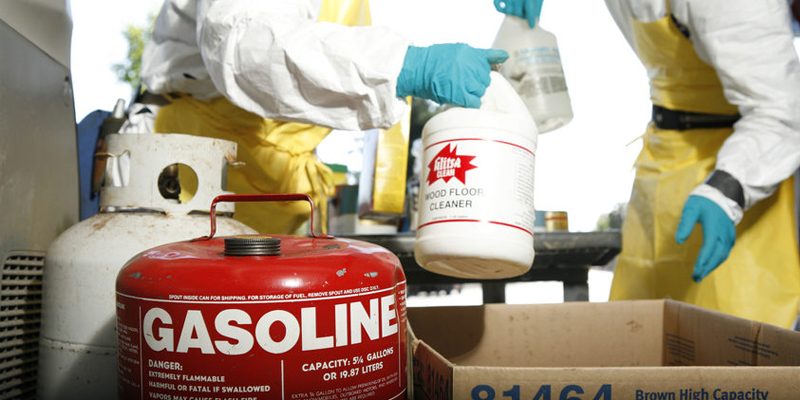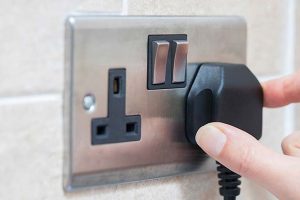Hazardous waste refers to any waste material that poses a threat to human health or the environment due to its chemical, physical, or biological properties. These wastes may contain toxic substances, flammable materials, corrosive substances, or other hazardous characteristics.
Here are some examples of hazardous waste that people may encounter in their daily lives:
Household Cleaners
Many common household cleaners, such as drain cleaners, oven cleaners, and some bathroom cleaners, contain corrosive or toxic chemicals.
Paint and Paint Products
Paints, varnishes, and paint thinners often contain hazardous substances like lead, mercury, or volatile organic compounds (VOCs).
Pesticides
Insecticides, herbicides, and fungicides used for pest control in gardens, lawns, or homes can contain toxic chemicals.
Batteries
Rechargeable batteries (e.g., lithium-ion, nickel-cadmium) and some disposable batteries (e.g., button batteries, lead-acid batteries) contain heavy metals like mercury, lead, or cadmium.
Electronics
Electronic devices such as old computers, televisions, cell phones, and other electronic gadgets can contain hazardous materials like lead, mercury, or brominated flame retardants.
Fluorescent Light Bulbs
Compact fluorescent lamps (CFLs) and other fluorescent light bulbs contain small amounts of mercury.
Motor Oil and Automotive Fluids
Used motor oil, transmission fluids, brake fluids, and coolant can contain hazardous substances like heavy metals and hydrocarbons.
Medications
Expired or unused medications, including prescription drugs and over-the-counter medicines, can be considered hazardous waste if not disposed of properly.
Solvents and Adhesives
Products such as paint thinners, glue, and certain adhesives can contain volatile or flammable chemicals.
Aerosol Cans
Aerosol cans, including spray paints, air fresheners, and some cleaning products, can contain propellants or flammable substances.
How to deal with hazardous waste?
Dealing with hazardous waste in your home requires proper handling and disposal to prevent harm to yourself, others, your neighbors, and the environment. Here are some guidelines to help you manage hazardous waste effectively:
Identify Hazardous Waste
Educate yourself about the types of materials considered hazardous waste. Common examples include certain cleaning products, pesticides, paint, batteries, automotive fluids, and electronic devices.
Read Product Labels and Safety Data Sheets (SDS)
Before purchasing or using any product, read the labels and SDS to determine if it contains hazardous substances. Follow the manufacturer’s instructions for safe use, storage, and disposal.
Reduce Hazardous Waste Generation
Minimize the use of hazardous products by opting for safer alternatives whenever possible. Use non-toxic or eco-friendly cleaning products, limit the purchase of hazardous chemicals, and buy only what you need to minimize waste.
Segregate and Store Properly
Keep hazardous waste separate from regular household waste to prevent cross-contamination. Store them in their original containers, ensuring lids are tightly closed and labels are intact. Place them in a designated, secure area away from children, pets, and heat sources.
Dispose of Properly
Do not dispose of hazardous waste in regular trash bins, sinks, toilets, or storm drains. Improper disposal can harm sanitation workers, contaminate water sources, or pollute the environment. Instead, follow local regulations and guidelines for hazardous waste disposal.
Contact Local Authorities
Research and reach out to local waste management facilities, recycling centers, or environmental agencies to inquire about proper disposal options for hazardous waste. They can provide guidance on drop-off locations, collection events, or hazardous waste pickup services in your area.
Participate in Recycling Programs
Many communities offer recycling programs for certain types of hazardous waste, such as batteries, electronics, and fluorescent light bulbs. Take advantage of these programs to ensure proper recycling and prevent these materials from entering the waste stream.
Seek Professional Assistance
If you have large quantities of hazardous waste or are unsure about the proper handling and disposal methods, contact professional hazardous waste disposal services. They have the expertise and resources to manage and dispose of hazardous materials safely.
Educate Yourself and Others
Stay informed about hazardous waste management practices and share your knowledge with family, friends, and neighbors. Encourage responsible disposal habits to protect the environment and promote a safer community.



